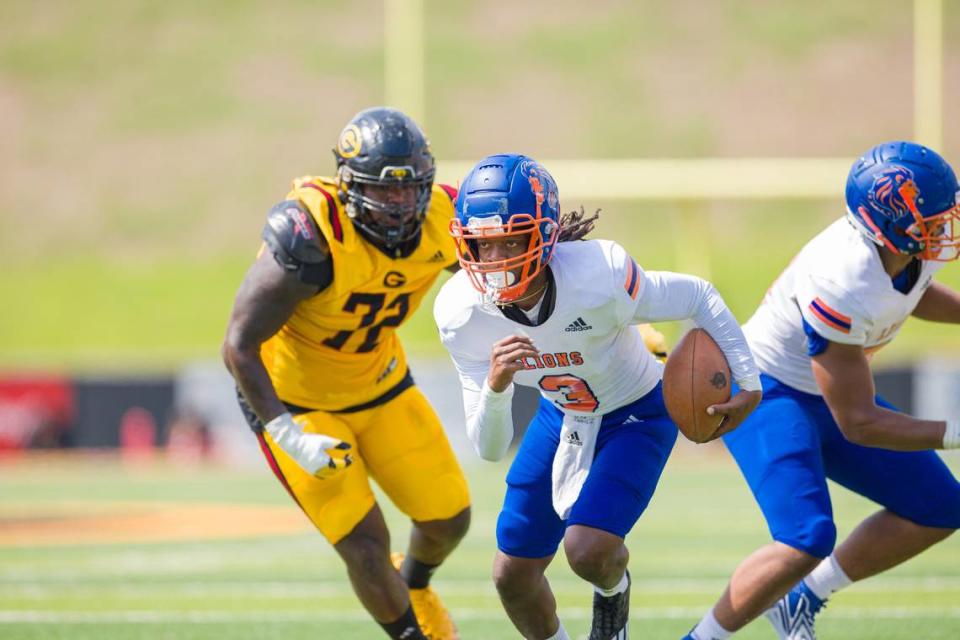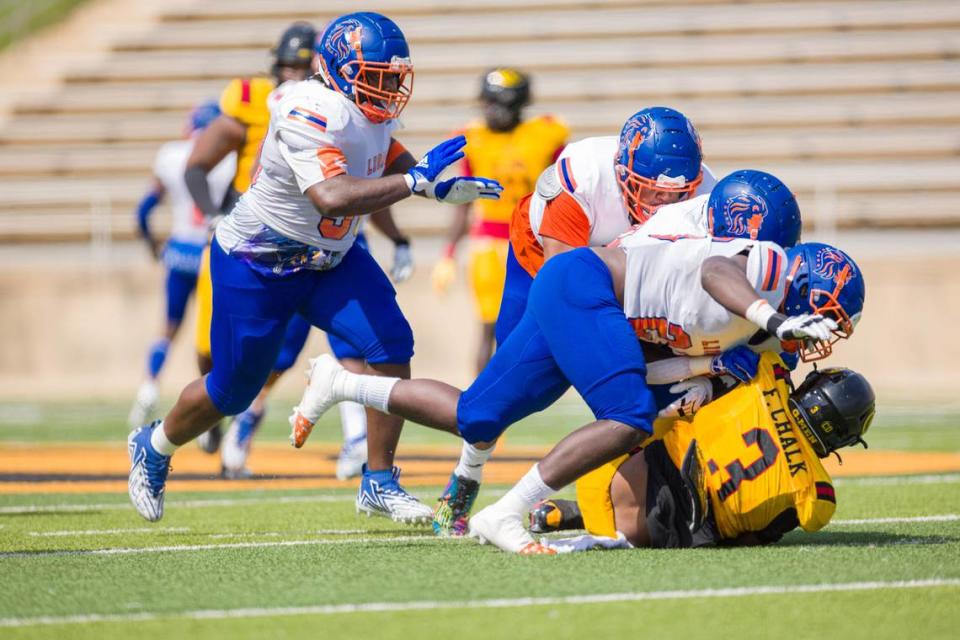Small-school college football is full of challenges, but Florida Memorial thrives on them
- Oops!Something went wrong.Please try again later.
- Oops!Something went wrong.Please try again later.
During a seemingly eternal 22-hour bus trip from Miami Gardens to Bluefield, Virginia, the Florida Memorial University football team was forced to take an unscheduled stop in Savannah, Georgia.
Reason?
Flat tire.
But rather than complain, the Lions players went to a nearby hotel, asked for permission and then proceeded to go through a walk-through on the property’s grass.
“We had to improvise,” Lions coach Bobby Rome II said.
The Lions — in their fourth season since reviving a program that had been dormant since 1958 — are, by now, masters of improvisation.
For example, when the kicker they had planned to use this year could not get eligible, Rome held tryouts, and the winner of the competition was 6-3, 270-pound Serge Champagne, a freshman defensive lineman from Coral Springs.
Rome says Champagne’s range is up to 28 yards. So far, the hefty kicker is 2 for 2 on field goals, with a long of 22, and 10-for-13 on extra points.
Then again, nothing has come easy for the Lions, an NAIA program. The first season of their revival was 2020 — the start of the COVID pandemic.
The Lions went 0-3 under coach Tim “Ice” Harris before being forced to cancel the rest of the season.
In 2021, FMU’s losing streak reached 10 games before the Lions beat visiting Union College 41-17. That marked FMU’s first win in 63 years.
Back then, FMU was known as Florida Normal and Industrial Institute.
Last year, Rome arrived, and the Lions had their best year in their modern era, going 3-7.
This season, the Lions (2-2 overall, 1-0 Sun Conference) seem improved once again. They earned a 38-21 win against Edward Waters — an NCAA Division II team. FMU quarterback Cedquan Smith — a transfer from Edward Waters — came off the bench and completed eight of nine passes for 125 yards and three touchdowns as the Lions won their first road game since their revival.
This past Saturday, the Lions beat Ave Maria, 56-13. Last season, the Lions lost 44-28 to Ave Maria.
Even FMU’s losses have been impressive. In the season-opening game at Bluefield, the Lions arrived in Virginia late Friday night. By Saturday at 9 a.m., they were back on the bus for a one-hour drive to the stadium, where they lost 50-47.
“[Bluefield] scored the winning touchdown with just 25 seconds left in the game,” Rome said. “They converted a fourth-and-17, and they got the ball down to our 2-yard line on a pass-interference penalty [to set up the winning TD].”
Indeed, that capped a 93-yard drive. FMU drove right back, but the Lions had a pass intercepted in the end zone on the final play.
FMU’s 58-22 loss at Grambling State on Sept. 16 was another point of pride for FMU.
First, Grambling is an NCAA Division I program and, as such, was heavily favored. Grambling has a rich history with past heroes including famed coach Eddie Robinson and Doug Williams, the first black quarterback to win a Super Bowl.
In addition, FMU led Grambling 3-0 in the first quarter, and the Lions trailed just 23-9 at halftime before wearing down.
Still, the result was a big improvement from last year when FMU lost 86-0 to a Division I team from the same conference as Grambling, Southern University.
“[In his postgame news conference], the Grambling coach [former NFL head coach Hue Jackson] praised how hard we played,” Rome said proudly.
FMU nearly had another win this season but a would-be victory against John Melvin University had to be changed to a mere scrimmage when the Lions’ opponent could not get NAIA certified in time for the game.
The Lions’ improvement is easy to decipher. Out of 127 players on the roster this year, about 85 are new to the team.
Rome said there’s more talent on the roster now, including 6-6, 350-pound Jeffrey Bonica, FMU’s starting right tackle from Miami Edison High. According to Rome, Bonica had originally committed to Georgia Tech, but he came to FMU because he wanted to say closer to home.
Lions running back Walter Wilbon, who is averaging 8.3 yards per carry, is a transfer from Ohio University. In three games for FMU, he has rushed for 463 yards and four touchdowns.
Another example of the upgrade in talent is linebacker Daeshawn Davis, who leads the team in tackles. Davis, who is from Cleveland, was a scholarship player at Iowa State, competing alongside two current NFL stars: 49ers quarterback Brock Purdy and Jets running back Breece Hall.
Davis, a 23-year-old finance major who wants to be a coach when he is done playing, said NAIA football is definitely different than Division I … but not as much as some may think.
“The NAIA level is kind of slower,” Davis said. “There are talented players in NAIA, but they aren’t as consistent. You see more busted coverages and guys not playing smart.”
Another major difference at FMU is the lack of an on-campus practice or playing field. The players practice and play at Betty T. Ferguson Stadium, which is three miles from campus.
In fact, practice starts every day before the sun comes up — at 6 a.m. Since there are no personal locker rooms for the players, they return to campus after practice and store their helmets and pads on the second floor of FMU’s basketball gym.
But Rome, who was a starter at fullback for the University of North Carolina (2005-2009) and was recently inducted into the Granby High School Sports Hall of Fame in Norfolk, Virginia, said it’s not that bad.
For starters, FMU fans show up in good numbers at Ferguson, which seats about 2,000 fans.
Secondly, Rome believes that the early practices, the long bus rides, the lack of on-campus facilities and all the rest serve to build character.
“It doesn’t faze us,” Rome said when asked about practicing at Ferguson. “[An on-campus field] has been spoken about, but I’m just a soldier. I follow the lead of our administration.
“[As for the 6 a.m. practices], it teaches our kids time management. They have to make adult decisions not to go out the night before because they know they have practice in the morning.
“We [coaches] are here for more than just football. We’re here to develop young men.”


